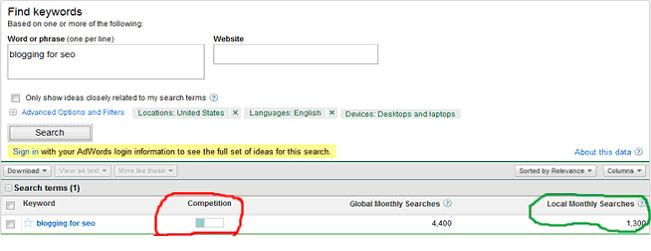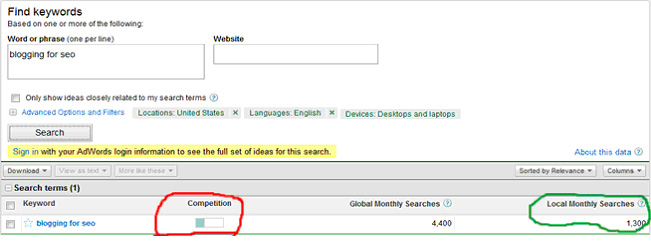Blog your Way to Better Ranking: Blogging for SEO
The content strategy in place to support your website’s SEO (Search Engine Optimization) is an integral tool to reaching the rank you want on the Big 3 search engines, Google, Bing, and Yahoo. Consistent blogging for SEO with keyword-oriented posts will not only build your online brand awareness with your target market, but also allows for regular click-thru’s to your site, and provides permanent backlinks to your web pages to drive your website up the search rank.
Planning a Blogging for SEO Content Strategy
When planning the editorial calendar for your blogging for SEO content, step one needs to be your keyword research. Selecting the top 15 or 20 keywords with marginal competition levels online will help guide the topics for your blog posts. When researching keywords using tools like Google Adwords Keyword Tool or Yahoo! Buzz, look at the local monthly search volume (Green circled below) and the competition level (Red circled below) to select the keywords that you’ll have the best chance of obtaining increased rank from fastest.

Once you select the top 15 or 20 keywords to be used (at a rate between 2-4% concentrations) in your blog posts, you can then plan your blog topics and editorial calendar to reach out with the content your target market is seeking in your niche.
Timeline for Blogging for SEO
Once you know the topics you want to cover in your blogging for SEO strategy, the timeline as to when you plan to post and how often you post is next in line for priority. When you’re looking at the potential benefits of blogging for SEO, the key to remember regarding the timeline is consistency. Maintaining a consistent and dependable schedule of content production can help increase your blog subscriptions, and therefore your click-thru’s, as well as the best possible response from search engines.
Tip: Search engines will penalize you for pushing too much content out at once, so keep your postings spaced out to allow for each post to be recognized then ranked in their own time.
Blogging for SEO
As you get down to the brass tacks of writing the content when blogging for SEO, there are a few points to keep in mind:
- Use your keyword in your title as well as between 2-4% in the content of your blog post.
- A hyperlink from the keyword two or three times to a related web page or landing page on your site. It is these hyperlinks that build the permanent backlinks that will increase your site’s web rank. They also provide brand-effective click-thru options for readers interested in learning more about your company. Tip: Here is an example hyperlink for the keyword SEO.
- Use your keywords as tags for your blog to help it be more easily searched online.
- Blogs can be short, long, can include graphics or other media. For best SEO results, blogging for SEO content should be at least 100 words long, with at least one keyword hyperlink.
Take the time to build effective blogging for SEO strategy to get your website ranked in your niche as quickly and effectively as possible.

